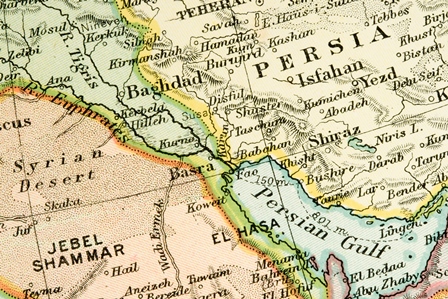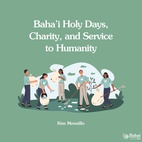The views expressed in our content reflect individual perspectives and do not represent the official views of the Baha'i Faith.
Today, the last day of the 12-day festival of Ridvan, people all around the world celebrate the beginning of the Baha’i Faith.
A hundred and fifty one years ago, on May 2nd, 1863, the Prophet and Founder of the Baha’i Faith, Baha’u’llah, rode out of Baghdad into an unknown and ultimately lifelong exile and imprisonment. But instead of observing a day of sadness, Baha’is observe this anniversary, called the Twelfth Day of Ridvan, as one of the high points of the Baha’i year.
 The Ridvan Festival commemorates Baha’u’llah’s twelve-day sojourn in the garden of Ridvan outside Baghdad, during the final days before His banishment to Istanbul, then known as Constantinople. Baha’is around the globe joyfully observe Ridvan (which means paradise) as a festival of renewal and peace, because it commemorates the beginnings of the Baha’i Faith and celebrates the first law of that new revelation, Baha’u’llah’s admonition to humanity to cease all warfare:
The Ridvan Festival commemorates Baha’u’llah’s twelve-day sojourn in the garden of Ridvan outside Baghdad, during the final days before His banishment to Istanbul, then known as Constantinople. Baha’is around the globe joyfully observe Ridvan (which means paradise) as a festival of renewal and peace, because it commemorates the beginnings of the Baha’i Faith and celebrates the first law of that new revelation, Baha’u’llah’s admonition to humanity to cease all warfare:
This is the Day in which God’s most excellent favors have been poured out upon men, the Day in which His most mighty grace hath been infused into all created things. It is incumbent upon all the peoples of the world to reconcile their differences, and, with perfect unity and peace, abide beneath the shadow of the Tree of His care and loving-kindness.
Baha’u’llah ultimately suffered forty years of exile, imprisonment and torture for His declaration of the peaceful, progressive Baha’i principles.
RELATED: Baha’u’llah: Out of Prison and into Exile
Because of Baha’u’llah’s increasing influence throughout the entire region and the large and growing number of followers attracted to His teachings, the Persian government began pressuring the governor of Baghdad to extradite Him in early 1863. Instead, Baha’u’llah received an order to relocate to the capitol of the Ottoman Empire, Constantinople (now Istanbul). Baha’u’llah’s first banishment, from Tehran in Persia to Baghdad in 1852, and His second, from Baghdad to Adrianople, were destined to be followed in rapid succession by two more – later in 1863 from Constantinople to Adrianople (Edirne) in northwestern Turkey near the Greek border; and then ultimately, in 1868 to the prison colony of Akka (Acre) in Palestine, where Baha’u’llah spent the rest of His life as a prisoner.
The weeks in the spring of 1863 before Baha’u’llah’s short sojourn in the Ridvan garden had been tragically sorrowful ones for His friends and family. Informed of the government’s banishment order, which would remove Baha’u’llah from Baghdad and tear Him away from most of them forever, they mourned and lamented. And now, on the day of departure, they felt enormous sadness and despair. A large contingent of approximately 75 people accompanied Baha’u’llah on his four-month trip to Constantinople, but a huge group of family, friends and followers stayed behind.
One eyewitness, a follower of Baha’u’llah named Mirza Asadu’llah Kashani, writes this account of Baha’u’llah’s departure from Baghdad, when thousands of followers had come to tearfully bid farewell:
…on the twelfth day, in the afternoon, they went from us, under the escort of Turkish soldiers to an unknown destination. Although Baha’u’llah had commanded the friends not to follow them, I was so loath to let Him go out of my sight, and I ran after them for three hours.
He saw me, and getting down from His horse, waited for me, telling me with His beautiful voice, full of love and kindness, to go back to Baghdad, and, with the friends, to set about our work, not slothfully, but with energy: “Be not overcome with sorrow – I am leaving friends I love in Baghdad. I will surely send to them tidings of our welfare. Be steadfast in your service to God, who doeth whatsoever he willeth. Live in such peace as will be permitted to you.”

We watched them disappear into the darkness with sinking hearts, for their enemies were powerful and cruel! Weeping bitterly, we turned our faces toward Baghdad, determined to live according to His command.
Baha’is celebrate the anniversary of this exile because Baha’u’llah’s Declaration marks the time when “the breezes of forgiveness were wafted over all creation,” when “the doors of the Kingdom have been opened unto you, the call of God is being raised, and the virtues of the human world are in the process of unfoldment.” With this revelatory action – announcing the advent of a new cycle of human progress, the organic unity of all humanity and the dawn of a new world Faith — Baha’u’llah transformed the occasion of His banishment from tragedy to triumph.
RELATED: Celebrating Ridvan Together– at a Distance
Today, the eve of Baha’u’llah’s departure from Baghdad is commemorated each year by Baha’i communities around the world, not as a time of sorrow or regret, but as a festival of great joy. The Twelfth Day of Ridvan stands as a demonstration of the power of the Manifestation of God to create good from evil, bring forth light from darkness, and win victory from seeming defeat.
– Adapted in part from Days of Ridvan, A Compilation, Kalimat Press, 1992.

















Comments
Sign in or create an account
Continue with Facebookor